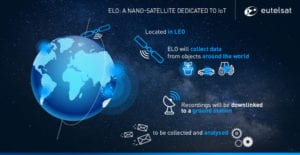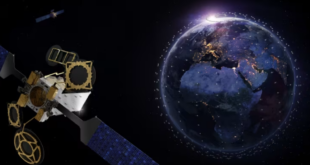
Eutelsat has unveiled its ELO constellation project targeting the Internet of Things (IoT) market.
The upcoming IoT market boom in sectors as diverse as transport, oil and gas, and agriculture means that tens of millions of objects will need to communicate with each other in areas unserved by terrestrial infrastructure. Eutelsat’s ELO constellation will offer global IoT coverage enabling objects to transmit data, irrespective of their location.
The construction of this nanosatellite constellation will begin with a first series of four satellites from Loft Orbital (ELO 1 and 2) and Clyde Space (ELO 3 and 4). With expected launch dates between 2020 and 2021, these four satellites will enter commercial service as soon as they are delivered into orbit. If this new initiative proves successful, other satellites will be added to the constellation, to reach a total of 25 satellites operational by 2022. The investment required for the constellation is included in Eutelsat’s existing Capex outlook. The cost associated with each satellite will not exceed 1 million euros.
This constellation project follows on from an initial nanosatellite ordered by Eutelsat from Tyvak International last year. Planned for launch early next year, the objective of this test satellite will be to confirm the technical performance of various waveforms between a satellite in low Earth orbit and objects on the ground.
Low Earth orbit is particularly suited for processing signals emitted by connected objects as it offers a ubiquitous satellite link, complementing terrestrial IoT networks, without increasing the cost or energy consumption of these objects.
Combining satellite technology with terrestrial IoT will be key to accessing the economies of scale required to deploy satellite IoT. Through ELO, Eutelsat’s aim is to position itself as the partner of choice for IT integrators and terrestrial operators seeking to offer their customers worldwide coverage.
Eutelsat has signed a strategic partnership with leading IoT player Sigfox, which runs a unique global narrowband network dedicated to this segment across 65 countries. Based on hybrid connected objects, whose data can be captured by both terrestrial networks and satellite, Sigfox will integrate the global coverage provided by the ELO constellation into its existing range of IoT connectivity services. This enhanced network coverage will open the door to many new use cases in areas like maritime transportation or logistics, but also the safety of people in emergency situations.
“We are delighted to be completing the first steps of our ELO constellation project, aimed at positioning Eutelsat in the nascent IoT segment,” commented Rodolphe Belmer, CEO of Eutelsat. Our partnership with Sigfox enables worldwide coverage through the combination of satellite and terrestrial IoT. This relatively modest investment at Group level, which is fully scalable, enables Eutelsat to access an additional potential growth lever in the context of its Connectivity strategy.”




